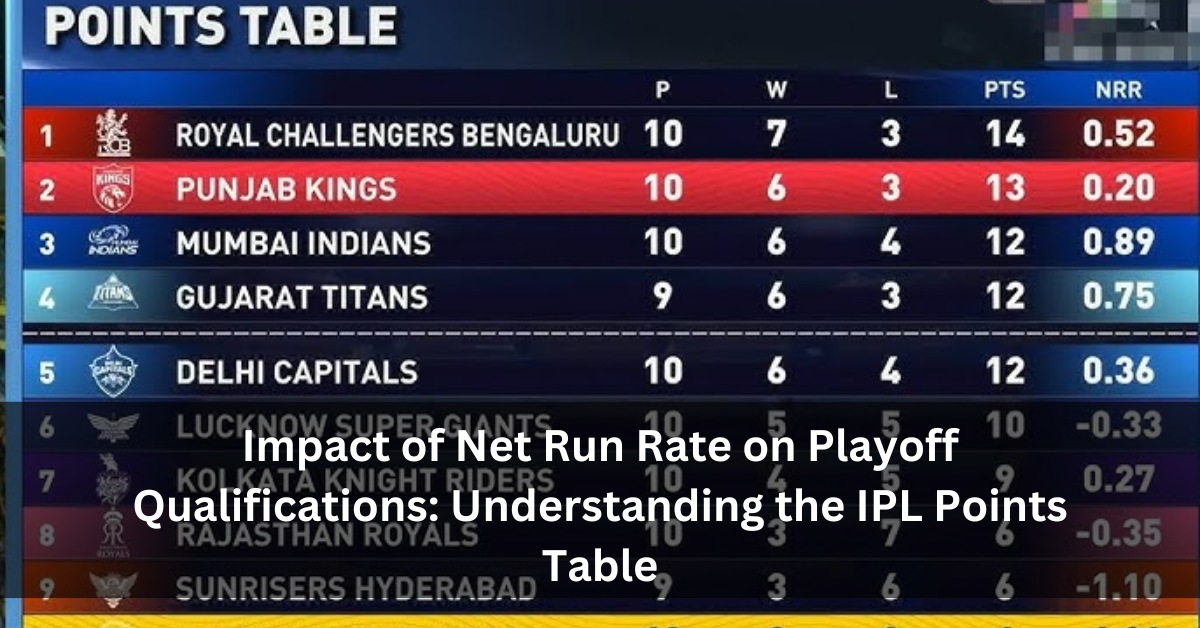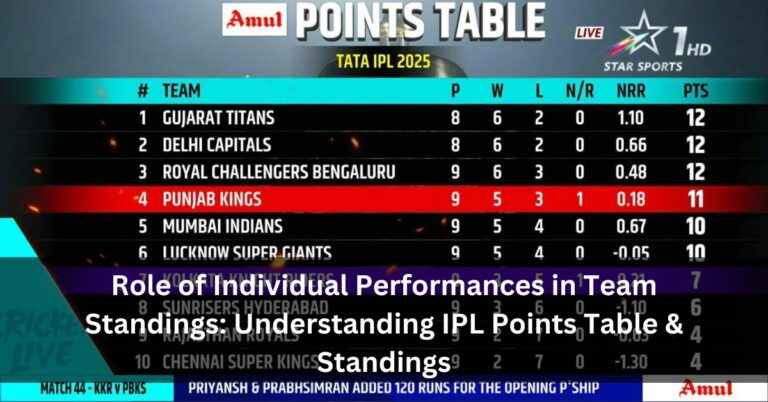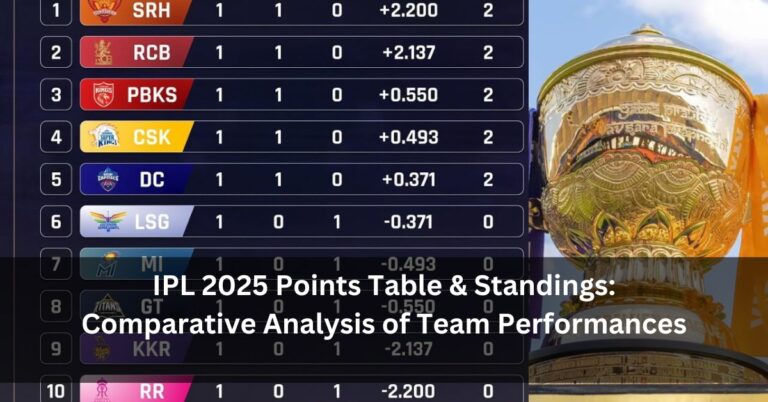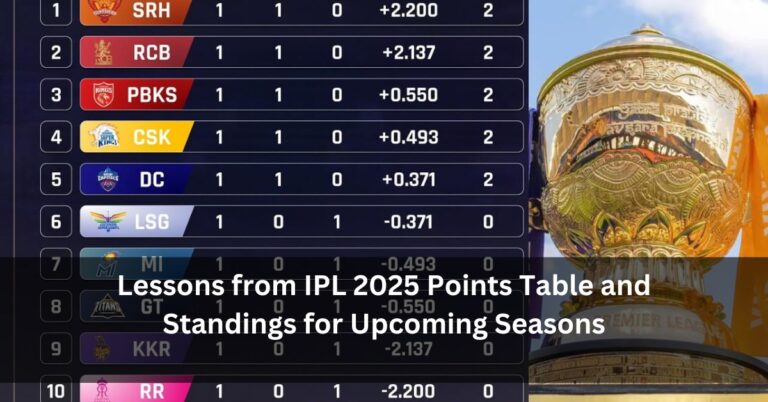Impact of Net Run Rate on Playoff Qualifications: Understanding the IPL Points Table
In the Indian Premier League (IPL), every run and every over counts, not only to win matches but also to secure a place in the playoffs. When teams end up with the same number of points in the points table, the Net Run Rate (NRR) often becomes the deciding factor. This blog will explain in simple terms what Net Run Rate is, how it affects playoff qualifications, and why fans and teams should pay close attention to it.
What is Net Run Rate?
Net Run Rate is a statistical measure used to rank teams that have equal points in the IPL points table. It reflects how well a team performs in terms of scoring runs and restricting the opposition.
In basic terms, NRR is calculated by finding the difference between:
- The average runs scored per over by a team, and
- The average runs conceded per over by the same team.
If a team scores runs faster than it allows its opponents to score, it has a positive NRR. Conversely, if a team concedes runs faster than it scores, its NRR will be negative.
Why Does Net Run Rate Matter in the IPL?
In the IPL points table, teams earn points based on match results — typically two points for a win and none for a loss. However, many teams often finish the league stage with the same number of points. In such cases, the NRR acts as a tie-breaker to decide which teams advance to the playoffs.
For example, if two teams both have 14 points, the one with the higher NRR will be ranked above the other. This can be the difference between making it to the playoffs or missing out.
NRR is especially important in a highly competitive season where many teams win and lose almost an equal number of games. It encourages teams not only to win but to do so with strong performances that boost their run rate.
How is Net Run Rate Calculated? A Simple Explanation
To understand NRR better, here’s a straightforward way to look at the calculation:
- Calculate average runs scored per over: Divide the total runs scored by the total overs faced by the team in all matches.
- Calculate average runs conceded per over: Divide the total runs conceded by the total overs bowled by the team.
- Subtract the two averages: Average runs scored per over – Average runs conceded per over = Net Run Rate.
For example, if a team scores at an average of 7.5 runs per over and concedes at an average of 7 runs per over, their NRR is +0.5.
How Does NRR Affect Playoff Qualifications?
The IPL playoff race often comes down to the points table, where several teams can have equal points toward the end of the league stage. At this point, the Net Run Rate becomes crucial. Teams with a better NRR have a higher chance of qualifying, even if their win-loss records are the same as others.
A good NRR can help a team stay ahead on the points table, while a poor NRR can cause a team to lose valuable ground. This is why teams try to:
- Win matches by large margins,
- Score runs quickly when chasing, and
- Bowl economically to restrict opponents.
By doing these, they not only win but also improve their NRR, strengthening their playoff chances.
Real IPL Scenarios: NRR in Action
In recent IPL seasons, the Net Run Rate has often decided which teams advance to the playoffs. For example, in IPL 2025, some teams are fighting hard to improve their NRR to secure a better position in the standings.
A team might lose a match but still qualify for playoffs if their overall NRR is better than their competitors. Similarly, teams that win narrow matches without boosting their NRR might find themselves at a disadvantage in a tight points table race.
This makes every run and every ball important throughout the tournament, as NRR can become the difference between continuing in the tournament or going home early.
How Can Teams Improve Their Net Run Rate?
Improving NRR requires consistent effort and strategy. Here are some ways teams aim to improve their NRR in the IPL:
- Winning by big margins: A large victory margin adds significantly to the team’s NRR.
- Fast scoring while chasing: Teams try to finish their targets quickly, which boosts their run rate.
- Restricting opponents: By bowling economically and taking wickets early, teams reduce the runs conceded.
- Maintaining pressure throughout the game: Even in matches where victory seems certain, teams focus on every ball to improve their NRR.
Where to Follow IPL Points Table and Net Run Rate Updates?
For all IPL fans and enthusiasts, keeping track of the latest points table and NRR is important to understand the playoff race. The IPL website offers updated information on team standings, points, and Net Run Rates after every match.
By visiting IPL, you can see how teams are performing and get insights into which teams are likely to qualify for the playoffs as the tournament progresses.
Frequently Asked Questions (FAQs)
Q1: What happens if two teams have the same points and the same Net Run Rate?
If teams have identical points and NRR, IPL rankings are decided by head-to-head results or other tie-breaker rules.
Q2: Does a team’s NRR change after every match?
Yes, the NRR is recalculated after each match, reflecting the team’s current performance.
Q3: Can a team with fewer wins qualify because of a better NRR?
No, wins matter most. But if points are equal, NRR decides which team ranks higher.
Q4: Why do some teams try to win matches by a large margin?
To improve their Net Run Rate and increase the chance of qualifying in case of a tie on points.
Conclusion
Net Run Rate plays a vital role in the IPL points table and the race to reach the playoffs. Understanding NRR helps fans appreciate why teams push hard not only to win but to win convincingly.
Whether you are following the IPL closely or just beginning to watch, knowing about NRR will give you a clearer picture of how the tournament progresses. For regular updates, detailed points table information, and expert insights, visit IPL regularly.
Stay informed and enjoy the thrilling moments of the IPL as your favourite teams battle it out, not just for wins but also for a strong Net Run Rate that can take them to the playoffs.







